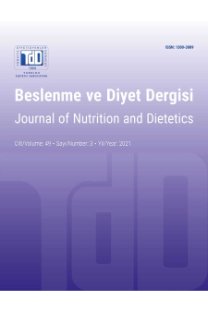Klasik Nonketotik Hiperglisinemi Tanılı Bebekte İlaca Dirençli Epilepsi Tedavisinde Ketojenik Diyet Uygulaması: Bir Olgu Sunumu
Nonketotik hiperglisinemi (NKH), glisin yıkımında görevli bir enzim eksikliğine bağlı otozomal resesif geçiş gösteren bir metabolizma hastalığıdır. Hipotoni, gelişme geriliği ve ilaca dirençli nöbetler ile karakterizedir. Gelişme geriliği ve 45 günlük iken başlayan nöbetler nedeniyle başvuran ve nonketotik hiperglisinemi tanısı alan hastaya yatışının ikinci gününde levetirasetam, dekstrometorfan ve sodyum benzoat tedavisi başlanmıştır. İzlemde fenobarbital eklenmesine karşılık nöbetleri devam eden hastaya ketojenik diyet tedavisi (KDT) başlanması planlanmıştır. Belirgin bir yan etkinin görülmediği hastada, tedavinin üçüncü gününden itibaren nöbet sıklığı ve şiddetinde %50’den fazla azalma görülmüştür. Klasik KDT, antiepileptik ilaçlara dirençli NKH hastalığında etkin ve güvenilir bir tedavi yöntemi olabilir.
Ketogenic Diet Treatment of Drug Resistance Epilepsy in an Infant with Classic Nonketotic Hyperglycinemia
Nonketotic hyperglycinemia (NKH) is an autosomal recessive metabolic disorder caused by an enzyme deficiency which breaks down the amino acid glycine. It is characterized by hypotonia, growth retardation and drug-resistant seizures. The patient presented to our clinic with growth retardation and seizures starting from the 45th days of age. A diagnosis of NKH was made, and levetiracetam, dextromethorphan and sodium benzoate were started in two days after diagnosis. Despite the addition of phenobarbital in the follow-up, the patient continued to have seizures and a ketogenic diet was planned. Frequency and severity of seizures were reduced by more than 50% at the third day of treatment, and no significant side effects were reported. Classic KDT may be an effective and reliable treatment in NKH patients with drug-resistant seizures.
___
- 1. Applegarth DA, Toone JR. Nonketotic hyperglycinemia (glycine encephalopathy): Laboratory diagnosis. Mol Genet Metab. 2001:74:139-46.
- 2. Swanson MA, Coughlin CR, Scharer GH, Szerlong HJ, Bjoraker KJ, Spector EB, et al. Biochemical and molecular predictors for prognosis in nonketotic hyperglycinemia. Ann Neurol. 2015;78:606-18.
- 3. Jacken J, de Koning T, van Hove J. Disorders GABA, glycine, serine and proline. In: Blau N, Duran M, Blaskovics ME, Gibson KM, editors. Physician’s Guide to the Laboratory Diagnosis of Metabolic Diseases. 2nd ed. Berlin:Springer; 2002. p.123-40.
- 4. Cusmai R, Martinelli D, Moavero R, Dionisi Vici C, Vigevano F, Castana C, et al. Ketogenic diet in early myoclonic encephalopathy due ton on ketotic hyperglycinemia. Eur J Pediatr Neurol. 2012;16:509-13.
- 5. Bzduch V, Behulova D, Kolnikova M, Payerova J, Fabriciova K. Ketogenic diet in nonketotic hyperglycinemia. J Inherit Metab Dis. 2010;33(S1):S31.
- 6. Kossoff E, Zupec-Kaniz B, Auvin S, Ballaban-Gil KR, Christina Bergqvist AG, Blackford R, et al. Optimal clinical management of children receiving dietary therapies for epilepsy: updated recommendations of the international ketogenic diet study group. Epilepsia Open. 2018;3(2):175-92.
- 7. Charlie Foundation for Ketogenic Therapies. Keto Diet Calculator. Available at: https://www.ketodietcalculator. org. Accessed February 10, 2019.
- 8. Thompson L, Fecske E, Salim M, Hall A. Use of the ketogenic diet in the neonatal intensive care unit - Safety and tolerabity. Epilepsia. 2017;58:e36-e39.
- ISSN: 1300-3089
- Yayın Aralığı: Yılda 3 Sayı
- Başlangıç: 1972
- Yayıncı: Türkiye Diyestisyenler Derneği
Sayıdaki Diğer Makaleler
Zeynep AKIŞIN, Ünsal YILMAZ, Melis KÖSE, Selvinaz EDİZER, Aycan ÜNALP
Betül Gülşen ATALAY, Simge AKYEL, Suat Özer ÖNER, Hasan Hakan ATALAY
Yaşlılarda Kardiyovasküler Hastalıklar ve Beslenme Etmenleri
Seda ÇİFTÇİ, Neslişah RAKICIOĞLU
Fatmanur Hümeyra ZENGİN, Gamze AKBULUT
Hastane Beslenme Hizmetlerinde Hasta Memnuniyeti
Ali Emrah BIYIKLI, SANİYE BİLİCİ
Moleküler Beslenme Çalışmaları ve Diyetisyen
Esra KÖSELER BEYAZ, Gül KIZILTAN
Yetişkin Çölyak Hastalarının Glutensiz Diyete Uyumu
Öznur AYDIN, Evrim KAHRAMANOĞLU AKSOY, Muhammet Yener AKPINAR, Zeynep GÖKTAŞ
Adölesanlarda Porsiyon Seçimi ile Beden Kütle İndeksi Arasındaki İlişkinin İncelenmesi
